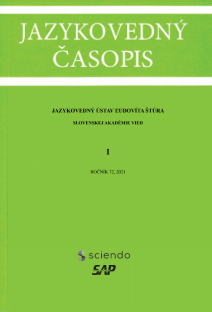Vlastné meno v kontexte nominačných vzťahov (prípad eponým)
Proper name within the framework of nomination. The case of eponyms
Author(s): Martin OloštiakSubject(s): Language and Literature Studies, Theoretical Linguistics, Lexis, Western Slavic Languages
Published by: Jazykovedný ústav Ľudovíta Štúra Slovenskej akadémie vied
Keywords: onomastics; nomination; eponymy; word-formation; polysemy (ambisemy); borrowing;Slovak language;
Summary/Abstract: The paper explores deonymic nomination, i.e. the formation of appellatives (eponyms) from proper names. By an eponym, any type of non-onymic unit formed from proper name is understood. The analysis is conducted using a database of 1,250 eponyms from Slovník slovenských eponym (Dictionary of Slovak Eponyms; Ološtiak et al., 2018) and a theory of lexical motivation as a methodological background is applied. From this viewpoint, formation of eponyms can be characterized as the loss of onymic motivation (onymic demotivation) and at the same time the acquisition of another type of motivation depending on the type of word-formation process (in a broader sense). In this regard, a word-formation process is understood as any way of coining a new lexeme (one-word unit, multi-word expression, new meaning, abbreviation, borrowing etc.). Eponyms are frequently coined by derivation (word-formation motivation, e.g. Albert ‘Albert County (Canada)’ →albertit ‘albertite’, Heine → heineovský ‘of or relating to H. Heine’) and by semantic shift with no part-of-speech change (semantic motivation, e.g. Pascal → pascal). Other processes are rare: part-of-speech change with no shift in morphemics (morphological motivation, e.g. Ježiš (noun) ‘Jesus’→ ježiš (interjection) ‘Jesus, an expression of emotion – surprise, anger, shock etc.’), abbreviation (abbreviation motivation, e.g. Mikojan + Gurevič → mig ‘a military aircraft’). In Slovak, most of the eponyms are loanwords (97.4%), thus, a special position is occupied by interlingual motivation.
Journal: Jazykovedný časopis
- Issue Year: 72/2021
- Issue No: 1
- Page Range: 80-100
- Page Count: 21
- Language: Slovak

